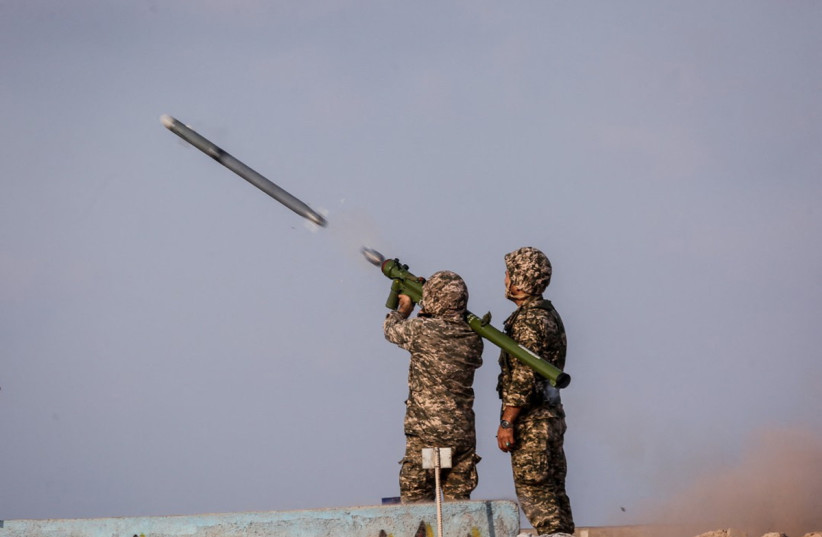The latest steps the US has offered to take in negotiations for a nuclear deal with Iran would bring billions of dollars to Tehran – in addition to the influx by returning to the original agreement – as well as Moscow, despite Western sanctions on Russia following its invasion of Ukraine.
The US is considering removing the Islamic Revolutionary Guard Corps’ designation as a Foreign Terrorist Organization, in exchange for a commitment to regional de-escalation, specifically not to target Americans in the Middle East, said a diplomatic source in Jerusalem.
Jerusalem strongly opposes the move, arguing that the IRGC is heavily involved in terrorism in the region, including against Israel, the US and its allies. Removing it from the FTO list sends a wrong message to Iran, and undermines the stated US policy to achieve a longer and stronger agreement, the Israeli source said.
The proposal is “as crazy as it seems,” maintained another senior diplomatic source. “The Americans’ level of motivation is almost religious. Once the Iranians are in, the Americans will sign.”
While the US is likely to keep post-Iran-deal sanctions on IRGC-affiliated individuals for terrorism and human rights offenses, the removal of the IRGC’s terrorist designation will be a boon to Iran’s economy, in addition to lifting nuclear-related sanctions as per the 2015 Joint Comprehensive Plan of Action.

The IRGC has played a huge role in Iran’s economy for decades, with its hands in a range of industries like energy, water, transportation, communications, infrastructure and more. This is what Iran’s leadership has called the “resistance economy,” making the Islamic Republic less vulnerable to sanctions by becoming more self-reliant.
With the IRGC considered a terrorist group, the US would be able to initiate legal proceedings against companies that work with its subsidiaries.
Lifting the IRGC’s terrorist designation, enacted by the Trump administration in 2019, will allow foreign companies to do business with subsidiaries of the group, which is behind warfare and terrorism across the Middle East and beyond.
The other matter holding up Iran talks in recent weeks is Russia’s demand for a carve-out from the existing sanctions.
More specifically, Moscow asked for guarantees – which Russian Foreign Minister Sergey Lavrov says it received this week – that will allow it to carry out nuclear work with Iran stipulated in the JCPOA, such as taking nuclear material that Tehran must get rid of in accordance with the deal, upgrading the Fordow nuclear energy plant, which Iran claims is for civil uses only, and to build two more nuclear reactors at the Bushehr nuclear power plant.
Of Russia’s demands, the Bushehr contract alone is worth $10 billion for Rosatom, the leading Russian energy company, according to a report in the Washington Free Beacon that cited Russian and Iranian documents.
The Russian delegation in Vienna tweeted that the “rapidly changing [international] environment made us think how to ensure that lifting of restrictions from Iran isn’t replaced with new barriers impeding normalization of cooperation... Additions were made to the text of the future agreement on JCPOA restoration to ensure that all the JCPOA-related projects, [especially] with Russian participation, as well as Bushehr NPP, are protected from negative impact of anti-Russian restrictions by US [and] EU.”
The Russian Embassy said that “discussion on a number of sensitive principled issues isn’t over yet. The targeted ‘fine tuning’ of the text of the JCPOA restoration agreement continues. We hope that our Western colleagues are conscious of the responsibility that lies on their shoulders.”
US State Department Spokesman Ned Price said the US “of course would not sanction Russian participation in nuclear projects that are part of resuming full implementation of the JCPOA... The new Russia-related sanctions are unrelated to a potential return to full compliance with the JCPOA, and they shouldn’t have any impact on its implementation.”
The P5+1 have been negotiating with Iran for the past 11 months to return to compliance with the 2015 nuclear deal with the US, which restricted Tehran’s uranium enrichment to 3.67% and cut almost all of its stockpile of enriched uranium in exchange for gradually lifting sanctions.
The US left the deal in 2018, arguing that Iran lied about its nuclear program, and that the agreement was too weak. US President Joe Biden promised to return to it.
Israel opposed the original deal and the return to it, pointing out that most of its limitations on Iran’s nuclear activities expire at the end of 2025, and that the agreement does not restrict Iran’s malign actions in the region or its ballistic missile program, while lifting sanctions would lead to a major cash influx for terrorism, proxy warfare and weapons.
In recent months, the US, EU and E3 – Britain, France and Germany – have warned that weeks remain before the deal’s nonproliferation benefits will become irrelevant, as Iran continues to violate the JCPOA.
Reuters reported on Wednesday that Iran has converted some of its 60% enriched uranium – weapons-grade is 90% – to a form that will be more difficult to dilute or transfer out of the country.
A secret report by the International Atomic Energy Agency said that Iran converted the uranium earlier this month.
“We strongly urge Iran to avoid undertaking any new escalations and in particular, call upon Iran to immediately cease all activity related to conversion of highly enriched uranium, which will have practical implications for returning to JCPOA limits,” the E3 said in a statement.
Justice Minister Gideon Sa’ar attended an event in Buenos Aires marking the 30th anniversary of the terrorist attack on the Israeli embassy by the Iran-backed Hezbollah terrorist group.
“Recently, we heard about a dangerous nuclear deal being reached between world powers and Iran,” Sa’ar said. “The deal will allow massive amounts of money to flow to Iran and its proxies, like Hezbollah, will hurt the peace and undermine the stability in the Middle East and will strengthen terrorist factors and extremism.”
Sa’ar is also expected to speak before the Argentine Congress.
